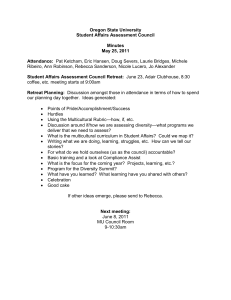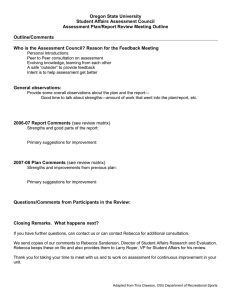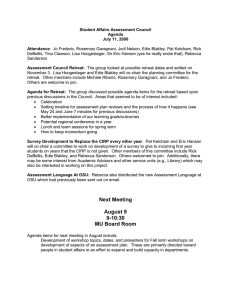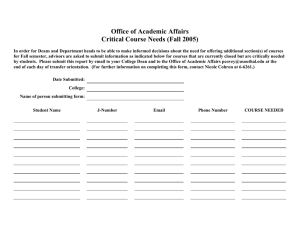Alvarez, Jennifer Vina, Melissa, Yamamoto, Jodi Nelson, Jo Alexander, Rick... Introductions Rebecca will be having a title change in the near... Student Affairs Assessment Council
advertisement
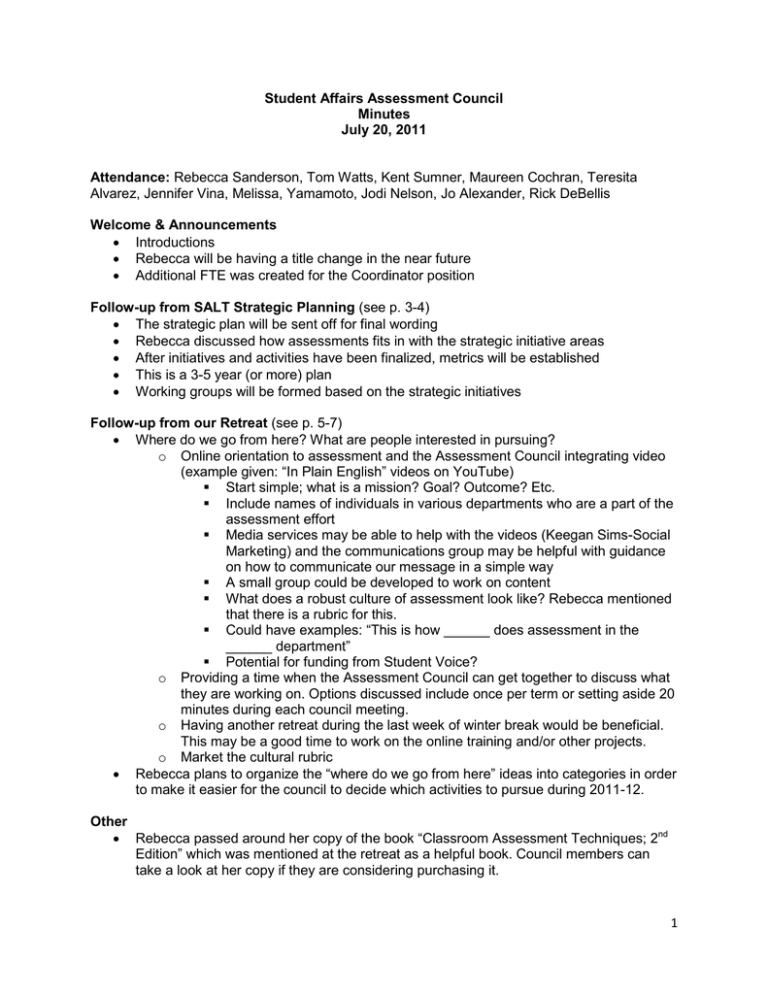
Student Affairs Assessment Council Minutes July 20, 2011 Attendance: Rebecca Sanderson, Tom Watts, Kent Sumner, Maureen Cochran, Teresita Alvarez, Jennifer Vina, Melissa, Yamamoto, Jodi Nelson, Jo Alexander, Rick DeBellis Welcome & Announcements Introductions Rebecca will be having a title change in the near future Additional FTE was created for the Coordinator position Follow-up from SALT Strategic Planning (see p. 3-4) The strategic plan will be sent off for final wording Rebecca discussed how assessments fits in with the strategic initiative areas After initiatives and activities have been finalized, metrics will be established This is a 3-5 year (or more) plan Working groups will be formed based on the strategic initiatives Follow-up from our Retreat (see p. 5-7) Where do we go from here? What are people interested in pursuing? o Online orientation to assessment and the Assessment Council integrating video (example given: “In Plain English” videos on YouTube) Start simple; what is a mission? Goal? Outcome? Etc. Include names of individuals in various departments who are a part of the assessment effort Media services may be able to help with the videos (Keegan Sims-Social Marketing) and the communications group may be helpful with guidance on how to communicate our message in a simple way A small group could be developed to work on content What does a robust culture of assessment look like? Rebecca mentioned that there is a rubric for this. Could have examples: “This is how ______ does assessment in the ______ department” Potential for funding from Student Voice? o Providing a time when the Assessment Council can get together to discuss what they are working on. Options discussed include once per term or setting aside 20 minutes during each council meeting. o Having another retreat during the last week of winter break would be beneficial. This may be a good time to work on the online training and/or other projects. o Market the cultural rubric Rebecca plans to organize the “where do we go from here” ideas into categories in order to make it easier for the council to decide which activities to pursue during 2011-12. Other Rebecca passed around her copy of the book “Classroom Assessment Techniques; 2nd Edition” which was mentioned at the retreat as a helpful book. Council members can take a look at her copy if they are considering purchasing it. 1 It would be helpful to schedule a work day or 2 half work days during which people could be away from their departments in order to devote time to working on their departmental assessment plans with the Research and Evaluation staff available. Rebecca said that she would reserve rooms at the end of August (a Tuesday and Wednesday morning schedule was preferred by the council members) and individuals would be responsible for bringing their own computer. Next Meeting August 3, 2011 MU Council Rm 9-10:30 September 14, 2011 MU Council Rm 9-10:30 2 Division of Student Affairs Strategic Planning Follow-up DRAFT INFORMATION —This will all go to a professional writer for clarity, polish, etc.-1. Student Affairs Mission, Vision, Goals Mission: We create engaging environments for student growth and success. Vision: We will inspire learners and leaders to create positive change in the world through selfdiscovery, connection to community, commitment to action, and love of learning. We will dedicate ourselves, individually and collectively, to student learning, community, citizenship, and success – through compassion, engagement, innovation, and action. Student Affairs Goals: The Division of Student Affairs will focus our energy and resources on the following aspects of community development: 1. We will create environments that strengthen holistic personal development and wellbeing of students. 2. We will cultivate to a positive, inclusive and engaging campus community where multiple perspectives are openly shared and can thrive 3. We will be a teaching and learning organization. We will enhance our own knowledge and the knowledge of others. 4. We will develop global citizens who are prepared and empowered to make meaningful contributions that are socially relevant. 2. Preamble: The Division of Student Affairs at Oregon State University is on an unprecedented journey. Our vision for the future, which is supported by a powerful strategic plan, calls for us to demonstrate bold leadership, implement innovative programs and engage in high-level service delivery. The spirit and optimism of our organization is buoyed by the understanding that we are a lively and vital organization, one that is firmly aligned with the mission of Oregon State University and deeply committed to creating and sustaining a campus environment that manifests a belief in the infinite potential embodied in each student. Our dual commitment to the future of our university and success of OSU students provides the solid foundation from which the future of Student Affairs will be pursued. Dynamic leadership focused on producing meaningful outcomes will characterize our future. For our organization no outcome is more important than ensuring that we provide access and pathways to success for all qualified students who desire an Oregon State University educational experience. Providing access demands that we are assertive in our outreach to and engagement with communities in our state, across the nation and around the world since we aspire to be a global educational community. Ensuring access also requires us to attend to understanding the unique life situations from which students come and to construct appropriate supports to mediate potential obstacles that may impede students’ ability to progress. Student success and progress is best facilitated by: 3 engagement in high-impact learning experience; exposure to diverse peoples, ideas and experiences; access to a personal community that offers a sense of belonging; and powerful learning environments facilitated by knowledgeable, caring and engaged faculty. Commitment to high-level achievement for students requires that we honor the wholeness of every student – acknowledging the student brings their mind, body and spirit to the educational experience. We will vigorously pursue efforts to construct -rich campus community implied in our mission and vision. In doing so, Student Affairs professional will build strong partnership within and outside of the OSU community. We will nurture a campus environment that makes evident that members of the Division of Student Affairs honors the strategic commitments of our university, takes seriously the aspirations of our student affairs organization, and is dedicated to making possible the unrealized dreams of current and future Oregon State University students. 3. Strategic Initiative Areas: (rough wording) 1. High level support programs and services 2. Best practices approaches to positively influence student engagement and learning outcomes 3. Establish appropriate resource base 4. High quality communication internally and externally 5. SA employees have sufficient knowledge and skills to advance our mission and the university mission 6. Build and sustain a robust culture of data-driven decision-making through research, assessment, evaluation, and planning 7. Care and affinity for OSU community and people and place 4. Strategic Activities that support the Strategic Initiatives --in process of being written from input by SALT 5. Metrics-how will we know we have accomplished the strategic initiatives? TBA 4 Student Affairs Assessment Council Retreat Follow-up Charting Our Future . . . Greatest Fear or Concern Greatest Dream or Hope Assessment is done for the wrong reasons (compliance vs. value added) Assessment in Student Affairs all supports end result of the student experience. Data is not used to make meaningful improvement Working together with clear outcomes Data used for punitive purposes Effectively handle changes in culture and processes Lack of intentionality in data collection Integrated into the culture so much so that we don’t need to talk about it and try to figure out how to get others to engage Part of the planning and implementation goals in Student Affairs Satisfied students that did not learn much Assessment seen as busy work People see the value in using assessment regularly for decision-making Won’t be able to invest the time to do this work because of other job demands Appreciation in units for those who have led the way in assessment, active support of department heads Lack of collaboration or consistency around assessment because of functional silos Mandated, inflexible assessment/data collection/reporting structures Assessment driven by the co-curriculum and documented in student portfolios and in a division portfolio Very satisfied students who have learned a lot in their higher education experience (and we can measure the learning) The data collected is used for conscious improvement Data is collected, but just sits there We won’t be up to the task of sustaining assessment on campus Data based decision-making—document, analyze and follow-through Burn out Satisfied students who have learned That units will relegate assessment to grad students and consider it done Lose fear of “finding out” that we don’t do some things as well as we think 5 With Our Hopes and Fears What are We Really Saying . . . • Assessment must be a priority that is consistently sustained at all levels in the organization. This is needed in order to produce useful information about student learning, services, and programs. Episodic or low priority assessment produces busy work but little that is of value to the organization. • Assessment must be conducted in collaboration (sharing outcomes, data and collection tools). If we are to be a learning organization that successfully engages students then we must be collaborative in how we examine the student experience. • People and departments must be supported in their assessment efforts. Without adequate resources and personnel devoted to building assessment capacity within the units, the work can only be episodic busy work. • Assessment must be conducted with integrity and the intention of authentic continuous improvement. Assessment is as much a “best practice” as any other activity that takes priority in our units. Otherwise, we are only going through the motions and creating busy work for ourselves and others. Where do we go from here? Ideas for 2011-2012 and beyond . . . • • • • • • • • • • • • • • • • • • • • Website with curriculum for orientation of assessment people Group of units pilot implementation of rubric and see about content validity, etc. Training on learning theory and how people learn Midyear feedback and consultation with those that did the review to have some continuity Classroom assessment techniques (DeAngelo and Cross—book—and how we might implement some of those techniques—use in assessment council Making assessment sustainable—creating an assessment sustainability plan Rubric—use with Idea Logic software Program for Diversity Summit—maybe on the rubric and its use Common language for assessment made more visible Move student employee to LGG’s and use the SV rubrics and Idea Logic software How to do easy reporting results to constituents Be sure we are moving in the same direction as the SA strategic plan and how will we know Develop a common rubric around assessment plan review (already have this) Update rubric to fit the published format for plans/reports Is it time to review how we review assessment plans Coffee book club—read a book a month and meet to discuss How can we begin to roll up data for a division report for key learning areas LGG’s how can they be incorporated into our plans as a focus—also the Bac Core learning outcomes— Partnerships in learning—intersections of learning between academic affairs and student affairs Bring what you are working on and have a place to consult and just talk about what we are doing—Maybe at least once a term in the Assessment Council meeting Maybe more assessment council meetings where we have academics come in and see how we can partner 6 • • • • • • • • • • • • • • Dr. Roper—learning outcome achievements in the annual reports—how we have shifted what we do based upon assessment How is assessment being managed—how to manage it better Assessment council—small group work in council meeting as consultation about issues What do we need for our own sustenance—consultant? Professional development? Conference? Maybe someone to take the lead and get us organized to do presentations, attend conferences, etc. Need Rebecca to do this Learn to speak the academic language Host/plan a conference Could we have another retreat in January in Hawaii—maybe just a half day someplace where we can get away and think together Standing alone—how do we get more people involved—spread the load—not be isolated—feel supported The change process—still in the midst of a cultural shift Organizational change/change theory/how to understand change and how to move Capacity-building research When do we feel most energized Doing an assessment plan together for the division Write a book chapter/book Short Term Plan Distribute notes from Assessment Council Retreat to the Council Devote summer meetings to setting priorities/making commitments/further planning Implement plans beginning fall term 7
